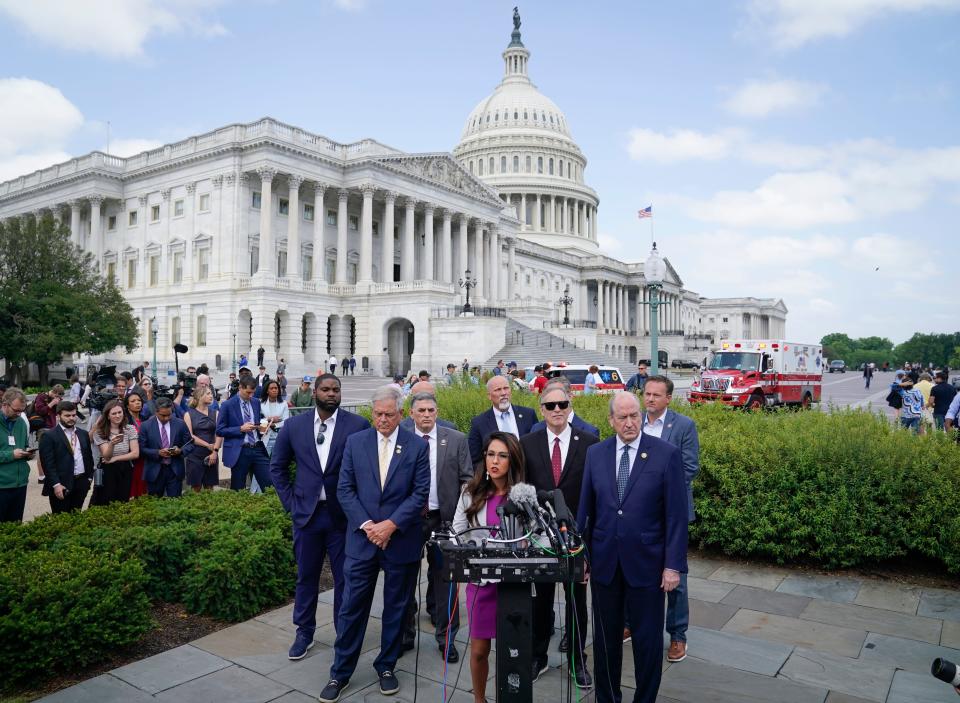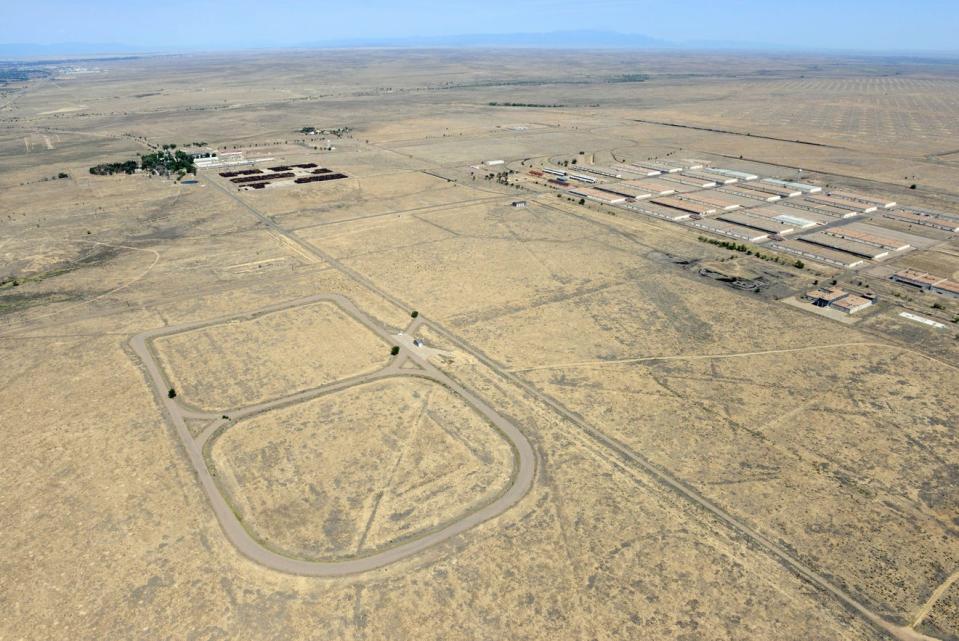Boebert bucks colleagues in House Freedom Caucus, supports defense spending bill
- Oops!Something went wrong.Please try again later.
- Oops!Something went wrong.Please try again later.
U.S. Rep. Lauren Boebert split with most of her colleagues in the House Freedom Caucus Thursday morning when she voted in favor of the 2024 National Defense Authorization Act, a massive military spending bill that is now awaiting the signature of President Joe Biden.
Boebert, a Republican from Silt who represents the Western Slope and Pueblo in Washington D.C., told the Chieftain her vote on the bill was "probably one of my more difficult votes" but she decided to vote in favor to support military service members and a Pueblo-specific bill she sponsored.
A version of that bill, the Pueblo Jobs Act, is included in the NDAA. This is the first bill Boebert has sponsored since being elected to the House in January 2021 that's expected to be signed into law, Boebert spokesperson Anthony Fakhoury confirmed with the Chieftain.
Here's why Boebert supported the legislation and how it could affect Pueblo.
Why Boebert decided to support this version of the NDAA
The final version of the NDAA does not include most of the contentious social issues that Boebert and other conservative legislators added to the House version of the bill earlier this year, but has historic raises for military members and the bipartisan Pueblo Jobs Act.
Boebert said in a phone interview Thursday that the military funding bill is the "most conservative NDAA" she has ever supported. Although the version that the Republican-controlled House passed along party lines earlier this summer would have been ideal, Boebert said she "tried to see the good in this one."
"The NDAA that I was the most proud of was what we passed out of the House earlier this year and I would have loved to have seen that, but we are in divided government and we did not get the wins that we wanted," Boebert said.
She said that there are some "horrible, horrible things" in the final version of the bill that she does not support, such as continuing to allow military funding for service members to travel to obtain abortions and maintaining the job for a military chief diversity officer. "I did consider voting against my own legislation because of this," she said.
"We did not get the wokeness out of the military," Boebert said. "We're seeing in recruitment rates that people do not want to join a woke military, but I have to look at the service members who are in my district — and I am very proud of the raise that that they're going to receive and the support that they're going to get."
Service members will get a 5.2% increase in compensation, which is the highest increase in more than 20 years, CNN reported.
Boebert said that House Republicans, with a slim four-seat majority, will need to do more compromising moving forward. "Hopefully, that doesn't mean that everyone is compromising on their principles, but we will be able to to work together," she said.
"I've learned in this job you do not always get what you want. Rarely ever do you get what you want, but sometimes you have to make these compromises in order to make some changes as opposed to none. I certainly will continue to fight against abortions in the military, drag shows on our bases and (diversity, equity and inclusion) training for soldiers," Boebert said.
The Pentagon cracked down on drag shows at military bases in June following pushback from some conservative lawmakers, Politico reported.
Boebert one of few Freedom Caucus members to support NDAA
The vast majority of representatives in the conservative House Freedom Caucus opposed the legislation Thursday morning.
Florida Rep. Matt Gaetz, who traveled to Pueblo with Boebert in October 2022, testified his opposition to the NDAA on the House floor.
"You almost feel like a parent who sent a child off to summer camp and they’ve come back a monster. That’s what we’ve done. This bill came back in far worse shape," Gaetz said.
The House Freedom Caucus issued a statement on Dec. 7 voicing opposition to several provisions in the bill, including an extension of authorizing foreign surveillance powers, The Hill reported.

Boebert is the communications chair of the House Freedom Caucus.
She said that she respects the decisions and votes of her colleagues in the caucus, which includes some of the most far-right representatives in Congress.
"There's no criticism or crossfire action taking place amongst friends," Boebert said.
She also said that Rep. Andy Biggs, a Republican from Arizona who also is a member of the House Freedom Caucus, has a "great bill" to reform the controversial foreign surveillance program.
Boebert said that hopefully the House can pass a "stronger" military funding bill next year when Speaker Mike Johnson (R-Louisiana), whom Boebert strongly supported as a replacement for the former speaker Kevin McCarthy, is in a "stronger position in negotiating."
A total of 73 Republicans and 45 Democrats opposed the legislation in the House, but the bill still exceeded the two-thirds majority threshold necessary to pass.
Bipartisan support was stronger in the Senate. All but 13 Senators voted in favor of the NDAA Wednesday evening.
Both of Colorado's U.S. Senators supported the NDAA.
How the bill could affect Pueblo
Bipartisan legislation that would transfer a parcel of land to PuebloPlex for economic redevelopment of the Pueblo Chemical Depot site is included in the bill now awaiting approval from the president.
The Pueblo legislation was passed as an amendment to the House version of the NDAA in July with a unanimous voice vote. A similar version of the bill also made it in the Senate's conference report on the NDAA released on Dec. 7.
The Pueblo Jobs Act would require the Army to close the Pueblo Chemical Depot no more than a year after the completion of the site’s chemical weapon destruction.
Boebert introduced the Pueblo Jobs Act to the House in April. A bill with similar text, the PUEBLO Act, was introduced by U.S. Sens. John Hickenlooper and Michael Bennet in June.
This bill would trigger the Army’s Base Realignment and Closure process that would then enable the sale of the site to PuebloPlex, which would acquire the remaining 7,000 acres of land for economic redevelopment. The redevelopment authority oversees 16,000 acres of depot property that it also wants to redevelop.
“Our bill is the result of collaboration between the Pueblo community, our military, and advocates in Colorado and Washington who know the value of investing in southern Colorado,” Hickenlooper said in a news release before the Senate voted on the NDAA. “This next step for the Pueblo Chemical Depot land will create new jobs and supercharge Pueblo’s economy — let’s finish the job.”
The site is set to undergo an extensive closure process that is expected to take multiple years and lead to thousands of lost jobs. The legislation seeks to mitigate the fallout from that as PuebloPlex is expected to repurpose the site for industrial use, potentially leading to an influx of jobs in the area.
“Since the second World War, the Pueblo Chemical Depot has helped safeguard our national security and provide economic opportunity for southeast Colorado,” Bennet said in a news release last week. “That’s why I worked to include our PUEBLO Act in this critical national defense bill — to ensure PuebloPlex has the certainty it needs to continue creating good-paying jobs and contributing to Pueblo’s local economy well into the future.”

More: Passenger trains linking Pueblo with Front Range cities is one step closer with federal grant
At least half of the workers at the site have expressed an interest in staying in Pueblo and efforts to “reskill and reemploy” some of them are underway, said Russell DeSalvo, president and CEO of PuebloPlex.
Earlier this month, PuebloPlex proposed a cybersecurity school project that could employ displaced workers, more than half of whom conveyed interest in learning the inner workings of the industry.
Boebert said that this legislation could help create 1,000 jobs in Pueblo.
"I'm glad that we we can show that there are things that we could work together, come together and agree on," Boebert said about the bipartisan collaboration. "There certainly are partisan issues that we're never going to agree on," she said, adding that she's working on "several" other bills that she's working on with bipartisan support.
The House version of the chemical depot bill was co-sponsored by Doug Lamborn and Ken Buck, the other Republicans representing Colorado in Washington D.C.
Buck's district includes much of the Eastern Plains. He is also a member of the House Freedom Caucus and voted against the NDAA. Rep. Lamborn, whose district includes much of El Paso County, is not a freedom caucus member and voted in favor of the legislation.
Chieftain reporter Josué Perez can be reached at JHPerez@gannett.com while Anna Lynn Winfrey, who covers politics for the Pueblo Chieftain, can be reached at awinfrey@gannett.com. Support local news, subscribe to The Pueblo Chieftain at subscribe.chieftain.com.
This article originally appeared on The Pueblo Chieftain: What the passage of US defense policy bill means for Pueblo, Colorado

